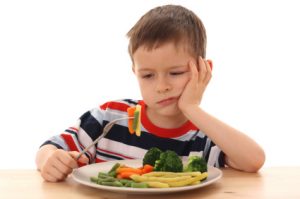Eating Disorders In Young Children On The Rise
 Eating disorders are dangerous at any age, but the greatest risks occur for children under 12. More and more children have been hospitalized for anorexia and bulimia in recent years. In fact, according to Dr. Eric Yancy, the hospitalization rates rose 119 percent for children under the age of 12 between 1999 and 2006. Associated with many physiological and psychological disorders, early onset eating disorders are a growing danger for young children.
Eating disorders are dangerous at any age, but the greatest risks occur for children under 12. More and more children have been hospitalized for anorexia and bulimia in recent years. In fact, according to Dr. Eric Yancy, the hospitalization rates rose 119 percent for children under the age of 12 between 1999 and 2006. Associated with many physiological and psychological disorders, early onset eating disorders are a growing danger for young children.
Difficulties of Diagnosing Eating Disorders in Young Children
The increase in hospitalization rates may be due to changing perceptions of diagnoses. One traditional standard for an eating disorder diagnosis is 25-85% weight loss, but children’s weights fluctuate so easily that not all children with disordered eating have lost 25% of their expected weight. The flawed criteria for expected weight pose another challenge to diagnosing eating disorders in young girls and boys. Expected weight requirements based on height do not account for stunted growth due to malnutrition and other factors. Amenorrhea can’t be used as a diagnostic tool because young girls often have not begun menstruation or have delayed the onset of menstruation through their disorder (and this criterion does not apply to young boys). Another challenge for diagnosing young children is the typical form of an early eating disorder—EDNOS, eating disorders not otherwise specified.
EDNOS in Young Children
About 60% of young children diagnosed with an eating disorder have a diagnosis of EDNOS (Psychiatric Times). Many times the disorder takes the form of selective eating disorder, picky-eating syndrome, or food avoidance emotional disorder. Both selective eating disorder and picky-eating syndrome occur because of sensory disturbances which lead to a dislike for certain tastes and textures. These disorders are associated with general anxiety and several physiological problems such as malnutrition, stunted growth, poor bone development, and sociability problems.
Some young girls (and boys) influenced by the media, social pressures, and general lack of world knowledge present with anorexia and bulimia. Children exposed to ultra-thin models and pressure from parents or peers to lose weight often do not fully understand the consequences of their actions. Without more experience in the world, children do not know enough to make informed choices about their eating and weight loss habits.
Dangers of Early Onset Eating Disorders
As previously mentioned, eating disorders in young children disrupt normal developmental processes. Stunted growth and malnutrition are two of the most common physiological effects of an early eating disorder. Additionally, young girls with anorexia or another EDNOS may experience delayed puberty and breast development. Eating disorders can exacerbate underlying psychological illnesses in young children such as depression and anxiety, and it may lead to an increased likelihood of substance abuse.
Parents of Young Children with Eating Disorders
Eating disorders in young children rarely reflect bad parenting. Rather, a multitude of factors contribute to eating disorders. Parents should teach their children healthy eating and exercise habits, and lead by example. Please consult with a doctor if you are concerned about your child’s eating habits, but there are many ways to decrease the risk of eating disorders in your own home.
Sources: Empowered Parents and Psychiatric Times
 Eating Disorder Self Test. Take the EAT-26 self test to see if you might have eating disorder symptoms that might require professional evaluation. All answers are confidential.
Eating Disorder Self Test. Take the EAT-26 self test to see if you might have eating disorder symptoms that might require professional evaluation. All answers are confidential.